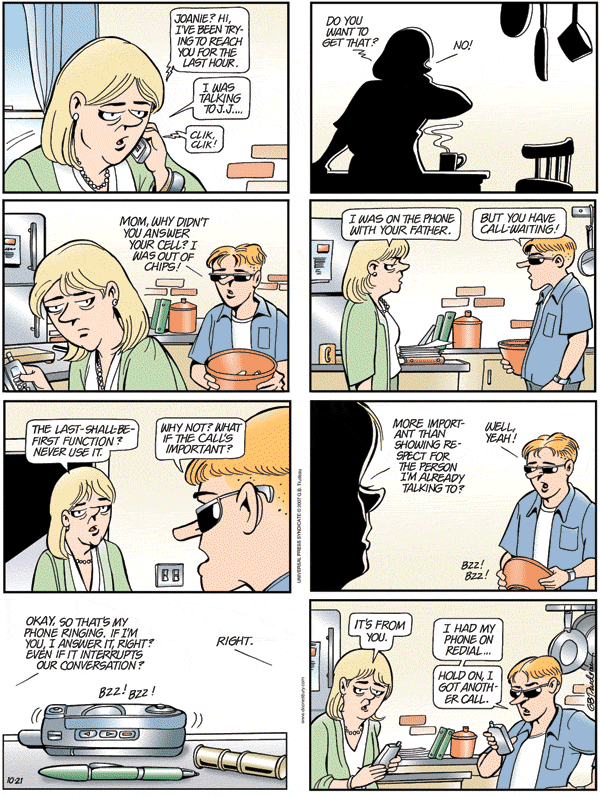October 21, 2007
Turn-taking etiquettes
In this morning's Doonesbury, Joanie refers to call waiting as "the last-shall-be-first" function:

I have the same opinion about call waiting, and in fact about cell phones in general, and for that matter about telephones of any kind. It's always seemed weird to me that people who would never consider barging into the middle of someone else's life in other ways, at least not without serious motivation and elaborate apologies, think nothing of making a randomly disruptive phone call. And people who would be surprised and offended by a random interruption in the flesh are completely unperturbed by random phone calls.
Let me add immediately that I use the phone a lot, and don't mind getting calls. For that matter, I generally like having people visit me in real life, even randomly and unannounced. I generally draw the line at call waiting, just because I hate being on the other side of "wait a minute, I've got another call" activity; and I do sometimes ignore incoming phone calls more than some people consider polite.
But the etiquette of phone calls and real-life interventions is very different. And email is another thing entirely; I've recently had to apologize to several correspondents whose emails I had apparently ignored, because I tend to run my email as what computer scientists call a "last in, first out (LIFO) queue", which is the same as what Joanie calls "last shall be first". This is not because I prefer or choose this algorithm, but because it's what email programs tend to promote, just as the call-waiting function does.
Since I get more email than I can comfortably answer, the result is that once a message gets buried under new arrivals, it may never resurface. I regret this, but (so far) not enough to do anything about it. In the case of call waiting, I can choose not to use it; in the case of email order, I'd have to take some positive action, for instance to assign priorities and decide how to act on them.
[Update -- Nicholas Waller writes:
In my very first proper summer job after school in 1975 (ie long before mobiles) I was assistant to someone in an electronics company, and I remember accompanying him to talk to the head of the Quality Control department. On arriving at his office, which had a glass door, we could see QC Chap was in a meeting. So my boss said "I can't interrupt him in person; we'll go back to my office and phone him". Which we did, successfully as I recall.
Later, as a publishers' rep in bookstores, I noted how often staff would break off from dealing with a customer who had made the effort to come in to the shop to take a phone call from someone sitting in an armchair at home.
But, oddly, as a customer myself I get edgy if a staff-member ignores an insistent ringing phone to continue dealing with me or another customer. It's stressful, and generally makes the shop sound not well run.
Imagine the difference if shop phones could not ring but could only allow a distant customer to say "excuse me, could you help me?", but walk-in customers carried a large bell that they could ring loudly at will to summon assistance, and keep on ringing until it arrived.
Personally, I have never been that keen on phones, either for receiving or making calls. The do seem a bit rude and intrusive.
The question of cell phone interruption etiquette recently made the news, of course, in the case of Rudy Giuliani's habit of taking phone calls from his wife Judith during speeches and fund-raising meetings. Among the many comments on this, I didn't see any that pointed out how complex and strange the etiquette of phone interruption has now become.]
Posted by Mark Liberman at October 21, 2007 10:20 AM